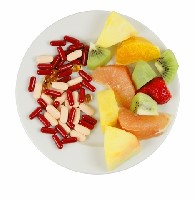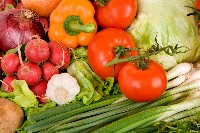|
Phytochemicals
Phytochemicals...also known as Phytonutrients are plant produced chemicals present in foods of plant origin such as fruits, vegetables and legumes The word Phyto means plant...which usually has a very positive association for most people. The word chemical has come to have something of a negative connotation especially when it is used in connection with food.
However, not all chemicals are synthetic toxins produced for industrial purposes. Plants are equipped with an amazing chemical factory that produces a vast array of nutrient compounds that help to protect the plant from pests and disease causing bacteria, fungi and viruses.
These nutrients also add the depth of color seen in the leaves and stems of plants which attract certain animals to them for food - this process helps to distribute the plant seeds. That's all very interesting..but So What... Well, When you eat fresh plant based foods as part of a healthy daily diet, you are also ingesting these healthy plant chemicals and they actually are extremely beneficial for your health too! Phytochemicals head up an ever expanding group of substances that staple foods contain in varying quantities and some high quality supplements contain in measured, standardized amounts.
here are some you should be aware of...and yes no surprises...they are all rather strange names!
Flavonoids are powerful antioxident chemicals that help to defend your body against heart disease and cancers. Healthy heart benefits include... Resveratrol, a type of flavonoid and a powerful antioxidant is present in wine and grapes and can help to lower blood sugar levels and also may help to cut the risk associated with low HDL in total cholesterol possibly by blocking cholesterol oxidation.
Like flavonoids, caratenoids are powerful antioxidants..helping to protect you against heart disease and cancers. Lycopene is a carotenoid that you have likely heard about that is found in ripe tomatoes among other sources.
Isoflavones: These are plant estrogens..not human estrogen...and can be found in soy milk and soy products such as tofu. This phytochemical is present in soy beans. Incidentally, the words soy and soya can be interchanged. Isoflavones may help to lower your LDL cholesterol level a few percentage points. You'd need to eat soya beans or soy products regularly to have this effect.
Saponins are also found in tomatoes, nuts, oats and potatoes. saponins are powerful anti-cancer agents and also are very helpful for lowering your total cholesterol level by attaching themselves to bile acids..found in your digestive tract. Bile acids are excreted from the body due to the soponin attachment..rather than being reabsorbed. Bile acids contain cholesterol. The excretion of bile..a digestive acid encourages your body to produce more bile....using up cholesterol as part of that process. This reduces your total cholesterol level.
Lignans are thought to have a protective effect against heart disease and cancer and are found in the following food sources; Flaxseed, apricots, strawberries, broccoli and cabbage.
These compounds are strong antioxidants and also stimulate the activity of protective enzymes. An enzyme is a molecule that facilitates and speeds up chemical reactions within your body. If you like adding some spice to your food then you'll be interested to know that tumeric contains a phenolic compound called curcumin which is the strong yellow coloring found in this spice. Bioflavonoids are a group of phytochemicals that belong to the polyphenol group of phytonutrient complexes. Rutin is a bioflavonoid that exists in abundance in buckwheat and to a lesser extent in fruits and vegetables.
Common sources of these phytochemicals are broccoli, brussel sprouts and cabbage. An isothyiocyanate that you may have heard of is sulforaphane which is found in good quantity in broccoli. This compound has been shown to have strong anti cancer properties.
The specific name of this phytonutrient is indole-3-carbinol or I3C
Indoles are a class of phytochemical that belong to a larger phytochemical family called Glucosinolates.
Allylic sulfides are able to control cholesterol and triyglyceride levels in your blood and also have an anti clotting effect. Allicin..also found in fresh raw garlic appears to help blood vessels relax which can help to reduce blood pressure and improve your blood flow to vital organs.
Perillyl alcohol is another type of monoterpene that has been shown to have strong anti cancer properties and can be found in cherries and spearmint. Geraniol..yet another monoterpene can be found in lemongrass oil and is a popular ingredient in some herbal teas.
Phytochemicals along with vitamins, minerals and essential plant sugars are part of a huge number of nutrients that you should ideally be consuming in your diet on a daily basis. They help to keep you well...they help to keep you free of disease.
Click here to go from Phytochemicals to Coronary Heart Health Home Page
|





